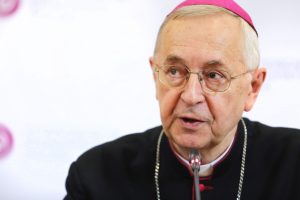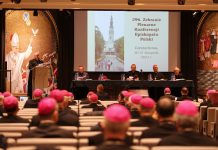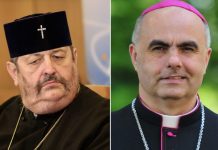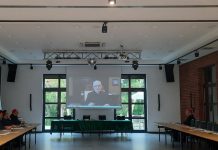“The ruling of the Constitutional Tribunal on abortion is, in the human dimension, a great, positive step in civilization,” said the President of the Polish Bishops’ Conference, Archbishop Stanisław Gądecki in an interview for the Catholic Information Agency. However, he stressed that “the fact that the Constitutional Tribunal’s decision has not been published raises many questions.”
The archbishop admitted that he was surprised by the escalation of social tension after the Constitutional Tribunal’s ruling, especially since this decision was, in the human dimension, a great, positive step in civilization. He stressed that the Constitutional Tribunal confirmed that Poland provides every human being with the legal protection of life, as the Constitution stipulates. He added that the ruling is also consistent with the Universal Declaration of Human Rights and its provision that every person is entitled to his personal life, freedom, and security.
“The right to life is, therefore, a fundamental human right, the first law which conditions the application of all other rights and, in particular, demonstrates the unlawfulness of all forms of abortion and euthanasia,” emphasized the episcopate’s president.
He assured that the Church cannot compromise the fifth commandment: “You shall not kill,” and that, from the perspective of faith, human life is sacred and inviolable from conception to natural death.
Archbishop Gądecki appreciated the Court’s decision, which confirms that “the concept of + life not worth living + is in direct contradiction to the principle of a democratic state of law.” “A person with a good conscience cannot deny anyone the right to live, especially because of his illness,” he added.
However, the archbishop is convinced that the State, society, and the Church should care for the children and the families directly affected by the Court’s decision.
“In such situations, we, as a society, have the duty to properly support and help mothers and their relatives. Women who learn from a diagnostic test result that their child may be prenatally ill or disabled, and the fathers of these children and their families, need extensive professional help,” he said.
In his opinion, it is also necessary to significantly increase the economic support they receive, provide constant medical and psychological care, and to create a systemic possibility of rest for parents caring for handicapped children.
“The whole society should be in solidarity with them and ready to provide all possible help,” says the archbishop.
In the interview for KAI (the Polish Catholic News Agency), he called to care for all mothers and families with disabled or seriously ill children. “The most vulnerable people and their families should be at the heart of every church community, be it a parish, a religious community or a religious movement. I, therefore, strongly encourage you to create communities or support groups in each parish, open in particular to families with disabled children, treating them as they fully deserve, that is, as our beloved sisters and brothers and providing them with all possible help,” he said.
“The first thing (…) is to learn to think about every human being, including the disabled, as a competent member of our community, perhaps contributing to it values different from those of than others, but with the same dignity, evoked, for example, in the Universal Declaration of Human Rights,” he indicated.
The President is grateful to those parliamentarians who participated in defending human life, which is one of the priorities among the activities of Catholic politicians. He said that the Church has supported and continues supporting their efforts. “This does not mean that religion is meddling in the temporal sphere, but the Church is justified in speaking out on purely ethical matters,” he stressed.
In Gądecki’s opinion, the misrepresentation of the right to kill innocent life as a human right is “an absolute and grave moral offense” that shows “deep disorientation and cultural confusion.” According to him, this error is not due to ignorance but rather results from “strong resistance to the natural law and the teaching of the Church.”
“It is spread by the new cultural code that young people encounter on a daily basis, including in the media,” the archbishop notes.
Responding during the interview, he emphasized that in his opinion the Church should not enter into an alliance with any political stream. “The Church must be vigilant, without making any arrangements. And, on the basis of this truth, it is to shape God’s order in the surrounding world,” he said.
When asked why the stereotype of an “alliance of the altar with the throne” has become rooted in the public consciousness in recent years, he replied that this is manipulation: first, one rebukes one of the politicians, and then smoothly transfers his allegations to the hierarchy of the Church or directly to the Church and suggests that PiS and the Church are one and the same thing. Then, in hundreds of thousands of online posts, outraged readers claim that they are breaking up with the Church because it is so bad, while such reactions are usually triggered by a statement made by a politician or someone from his circle.
“If we were to assume that the majority of Polish bishops are privately closer to this or that party, then we should all the more appreciate their restraint in speaking about current events,” he assessed.
He noted that, despite what is persistently repeated, “the Church in Poland is not on the side of the right or left, or even on the side of the center, but on the side of the Gospel; yet, some politicians and journalists continue to insist that the Church is the ally of the ruling party.”
According to Gądecki, the Church and the world of politics have different goals: The Church is to be a sign and instrument of salvation, and politics are temporal matters. “As the Catholic Church, we are happy when a party lives up to the values we stand for. But this does not mean that we, as a Church, can support any party. The Church cannot privilege any party because each party is only a party, and the Church does not have a biased message but carries a universal proclamation; it is to be a sign and an instrument of salvation for all,” he explained in the interview for KAI.
He emphasized that one should try to look positively at every human being, also politicians. “We must believe that they want the good of the homeland (…). Perhaps, they sometimes act too hastily, without sufficient reflection; that is why there are so many misunderstandings,” assessed the archbishop.
According to him, in the present situation, the parliamentarians who supported the defense of life are worthy of the highest recognition.
He assessed that one of the reasons for the current attacks on churches, especially during services—for example, in the cathedral in Poznań—is the Church’s teaching and the backing She gave to the parliamentarians who supported the elimination of the eugenic premise.
Another reason is the unconditional, disinterested hatred towards Christianity in general, conditioned in various ways because the protesting circles are concerned with an inhuman postulate—consent to killing unborn children on request—, believes the president of the Polish Bishops’ Conference. This also raises questions about whether we are allowed to enforce heroic decisions by means of penal law. He recalled that Christianity demands heroism and, in face of the question of the quality of human life, it always responds with the truth of the necessity to defend life itself as a fundamental value.
Yet other reasons are the failure of the education system—both on the part of the Church and the school—and the vivid resentment of various groups towards the present government, and their desire to overthrow it—turned by some politicians against the Church.
The demonstrations helped the Church to realize more clearly how far the secularization and degradation of our culture have gone. Western patterns have been widely transferred to our land. The model of living according to the principles of consumerism without suffering and without worries has become the desire of many, noted the archbishop.
According to him, the answer to these protests is the motto: “Do not be overcome by evil, but overcome evil with good,” he emphasized, thanking the priests and laypeople who courageously defend their churches. “We see that that the ecclesial service of order is coming back into favor,” he noted. He also recalled that the Permanent Council of the Polish Bishops’ Conference has called to respond by fasting, alms-giving, and prayer, with a specially prepared prayer for social peace, with the intention of protecting life, terminating the ongoing crisis, and ending the still-spreading pandemic.
When asked about dialogue with the protesters, he indicated that it could not be understood as the resignation from seeking the truth and would only be engaged in as an exchange of opinions.
“Many are also convinced that dialogue with the protesters is impossible. The abusive language they use is an unacceptable form of expression. Others argue that it is not worth talking to everyone, because how are believers to react, for example, to the phenomenon of militant atheism? There are people for whom the only value is to destroy everything that is valuable. Even if we, as Christians, are to love our enemies, it would be false if we called our enemies—that is, those who want to destroy us—friends,” said Gądecki.
“Now, it is necessary to strive for dialogue, if only so that conflicts in the homeland are not used for political purposes contrary to the good of the nation. Debate is part of the political art, but social disputes and divisions cannot be treated as a method for politics. The effectiveness of politicians should not be judged through the prism of their ability to achieve short-term political goals. What counts in the public service is the art of introducing permanent and timeless changes that strengthen the State. Therefore, it is necessary—especially in fundamental matters— to strive to unite and not divide the society,” he argued in the interview for KAI.
He assessed that, unfortunately, neither the Church nor the Catholic faithful could—even in the name of “social peace”—support the latest initiative of President Andrzej Duda, who proposed changes to the act, allowing abortion in the event of a high probability that the child would be still-born, burdened with an incurable disease or a defect that would lead to his death.
“The President’s proposal would be a new form of euthanasia that selects individuals on the basis of their chances of survival. This time, cases of abortion for eugenic reasons will be subsumed under the new regulation—probably except for children with Down syndrome—and everything will remain at the same point,” believes the head of the Polish episcopate.
Gądecki recalled that according to Marxist roots the law is the most perfect tool for influencing social relations. “Healthy societies are characterized by respect for moral norms and faithfulness to the customs of tradition and culture. The law should be consistent with morality, but it is morality that should shape the law, not the other way around,” he noted.
When asked about the negative attitude of some of the younger generation towards the Church—as shown by the recent protests—, he concluded that some priests working with young people excel in reaching them, but there are also others weary at the very thought of having to go to a school.
According to Gądecki, young people bear the weight of today’s media culture, and opponents of the Church abundantly use channels of content distribution and formation of consciences that are little used in the Church herself.
“Young generations are shaped by tools such as Facebook, Instagram, Twitter, YouTube, Netflix, and other streaming platforms and social media. A cultural code is also imposed in computer games or film productions,” he said evoking, in the interview for KAI, his conversation with a lawyer, father of two high school students. “Today, in the era of the second communication revolution, almost every Netflix youth series promotes homosexuality, hedonism, and promiscuity,” according to that father’s assessment.
In the opinion of the archbishop, these are “areas fully developed by cultural Marxists who consistently implement the program of formation obedient to new ideas of man.” “And it is not just a question of the content available through these technologies, but it also concerns who actually makes decisions about allowing or excluding specific content to pass through them,” he said.
In his view, a media campaign “consistently promoting modern life as the highest value could possibly be more effective on the social level than all the laws and sentences of the Tribunal put together,” despite the fact that the media are systematically campaigning in the opposite direction.
In a Biblical perspective, the archbishop compares the current situation to how a new generation of Israelites in the Old Testament departed from God, pointing out that the lack of personal experience of God’s goodness easily leads us to disregard God Himself. However, he finds hope in the Gospel, as Jesus goes out to sinners with mercy and, like a good shepherd, rejoices in finding every lost sheep, the conversion of every sinner.

 Polski
Polski







